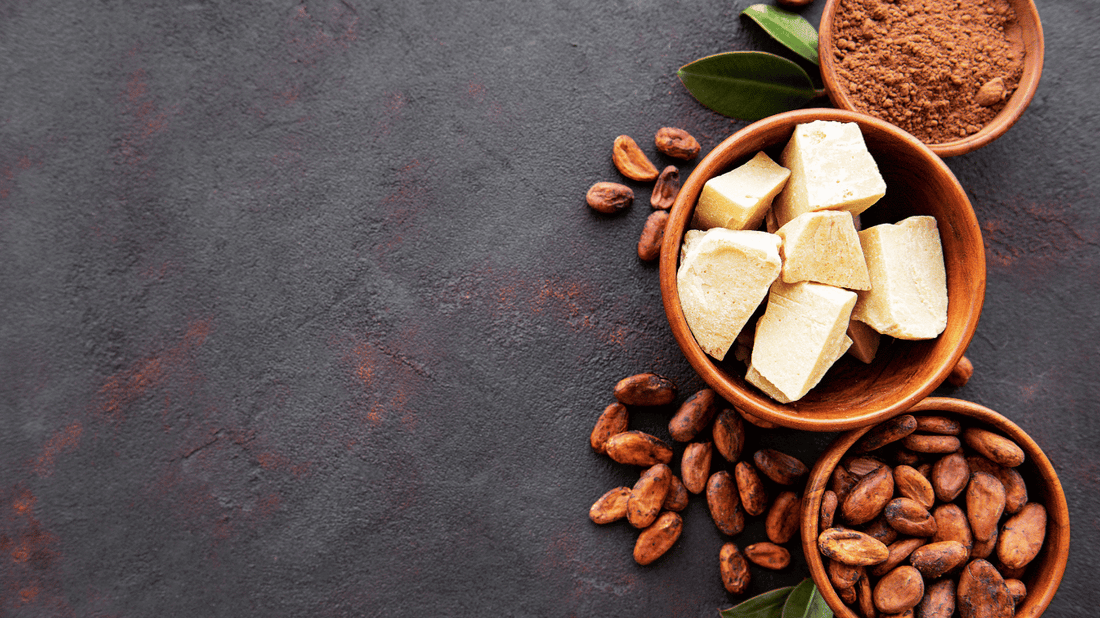Cocoa butter, derived from the cocoa bean, is celebrated for its moisturising capabilities and is often touted as a skincare marvel, especially when applied to the face. Its myriad benefits range from hydrating dry skin to potentially reducing the appearance of wrinkles and scars. However, let's delve deeper into these advantages, mindful of the guidelines provided.
Introduction to Cocoa Butter
Cocoa butter, a fat extracted from the cocoa bean, has been a staple in both skincare and culinary realms for centuries. Originating from the cacao tree, cocoa butter's rich history includes its use by ancient civilisations such as the Mayans and Aztecs, not only as a skincare elixir but also as a valuable currency. The benefits of using cocoa butter on the face stem from its natural origins and the meticulous process of drying, roasting, and pressing the beans to extract this luxurious butter.

Benefits for the Skin
The benefits of cocoa butter on the skin are manifold. Its hydrating properties are unparalleled, thanks to its ability to form a protective barrier on the skin's surface, thus preventing moisture loss. Furthermore, cocoa butter is packed with phytochemicals, offering protection against UV damage and potentially aiding in scar reduction, although more research is needed to support this claim conclusively.
Hydrating Properties:
Mechanism of Action: Cocoa butter is a natural emollient, meaning it fills in the gaps in your skin to create a smooth, protective barrier. This barrier not only locks in moisture but also prevents environmental toxins and pollutants from penetrating the skin.
Long-lasting Hydration: Unlike some moisturisers that provide temporary relief, cocoa butter's rich consistency ensures prolonged hydration, making it especially beneficial for individuals with dry or flaky skin.
Protective Barrier Formation:
Transepidermal Water Loss (TEWL) Reduction: By forming a protective layer over the skin, cocoa butter significantly reduces TEWL, where water passes from inside the body through the skin and evaporates into the air, a common issue in dry and colder climates.
Enhanced Skin Resilience: This barrier not only retains moisture but also enhances the skin's resilience against mechanical stresses, such as stretching and bending, thereby maintaining its elasticity and suppleness.
Rich in Phytochemicals:
UV Protection: The phytochemicals in cocoa butter, including some forms of Vitamin E and other antioxidants, can absorb harmful UV radiation, providing an added layer of protection against sun damage. While it should not replace sunscreen, it can complement your sun protection regimen.
Scar Treatment Potential: These antioxidants also play a role in the body's healing process. There's anecdotal evidence suggesting that cocoa butter can help in reducing the appearance of scars by promoting the regeneration of new skin cells. However, scientific research is still ongoing to substantiate these claims fully.

Potential Aid in Scar Reduction:
Skin Regeneration: The fatty acids in cocoa butter may help in nourishing and healing the skin, which is crucial for scar treatment. By keeping the skin hydrated, cocoa butter can also prevent the scarring from becoming worse due to dryness.
Collagen Production: There is some evidence to suggest that the components of cocoa butter can stimulate the production of collagen, a vital protein for skin strength and elasticity, thus aiding in the reduction of scars over time.
Considerations for Use:
Patch Testing: Given its rich texture, it's prudent for individuals, especially those with sensitive or acne-prone skin, to conduct a patch test before full application. This ensures compatibility and minimises the risk of clogged pores or allergic reactions.
Application Techniques: For best results, cocoa butter should be applied to damp skin to lock in moisture. It's most effective when used after showering or bathing.
Cocoa Butter for Wrinkles
When considering cocoa butter on face at night benefits, its role in combating wrinkles is noteworthy. Anecdotal evidence suggests cocoa butter can enhance skin elasticity and offer UV protection, thereby preventing premature ageing. However, scientific validation of cocoa butter's anti-ageing effects remains sparse.
Application Tips
For those pondering is cocoa butter is good for the face, how you apply it can make a significant difference. Post-cleansing and exfoliation, applying cocoa butter at night can lead to optimal hydration. It's particularly effective for treating dry skin conditions like eczema and psoriasis, locking in moisture for a rejuvenated appearance by morning. Diving deeper into the application tips for using cocoa butter on the face, especially considering its benefits for dry skin conditions like eczema and psoriasis:
Optimal Timing for Application:
Nightly Routine: Integrating cocoa butter into your nightly skincare routine allows it to work its magic uninterrupted. Night-time is ideal because the skin undergoes repair and regeneration while you sleep, making it receptive to the deep moisturizing effects of cocoa butter.
Post-Cleansing and Exfoliation: Applying cocoa butter after cleansing and exfoliating the skin ensures that any impurities or dead skin cells have been removed. This maximises the absorption of cocoa butter, allowing its nutrients to penetrate deeper into the skin.

Application Method for Maximum Benefit:
Warm It Up: Before application, warm a small amount of cocoa butter between your hands. This not only makes it easier to apply but also enhances absorption.
Gentle Application: Apply the cocoa butter in gentle, circular motions to encourage blood flow and enhance absorption without pulling or dragging the skin, which can irritate, especially in sensitive areas.
Special Attention to Dry Areas: While cocoa butter can be applied all over the face, paying special attention to particularly dry or affected areas can provide targeted relief and healing.
Use in Treating Dry Skin Conditions:
Eczema and Psoriasis: For those with eczema or psoriasis, cocoa butter offers a soothing effect, reducing the itchiness and flakiness associated with these conditions. Its emollient properties help to repair the skin barrier, which is often compromised in such skin issues.
Overnight Hydration: Applying a thicker layer as part of your night routine can act as an intensive overnight hydration mask, providing a significant moisture boost and aiding in the skin's natural healing process.
Locking in Moisture:
Damp Skin Application: For best results, apply cocoa butter on slightly damp skin. This helps to lock in the extra moisture, further hydrating the skin and enhancing the effectiveness of cocoa butter.
Frequency and Quantity:
Moderation is Key: While it might be tempting to use large amounts for quicker results, it's important to use cocoa butter in moderation. A small amount goes a long way, and over-application can lead to clogged pores, especially for those with naturally oily skin.
Complementary Skincare Products:
Layering Products: If using other skincare products or treatments, apply those first and let them absorb into the skin before applying cocoa butter. This ensures that each product can work effectively without hindering the performance of others.
Sun Protection: In the daytime, follow up with a broad-spectrum sunscreen to protect your skin from UV damage, as cocoa butter does not provide sufficient sun protection on its own.

Risks and Considerations
However, it's crucial to be cautious. Is cocoa butter good for your face acne? Its thick consistency may not suit acne-prone skin, as it can clog pores and trigger breakouts. A spot test is recommended to ensure its suitability for your skin type.
Cocoa butter in sunscreen
The cocoa butter in sunscreen formulations elevates the product's moisturising capabilities, making it an exceptional choice for those seeking both sun protection and skin nourishment. Cocoa butter's natural emollient properties ensure that the skin remains hydrated and supple under the sun, effectively reducing the drying effects often associated with sun exposure.
Moreover, its rich content of antioxidants adds a layer of defence against environmental stressors, enhancing the sunscreen's overall protective qualities. This synergy of hydration and protection makes cocoa butter-infused sunscreens a preferred option for individuals looking to maintain healthy, radiant skin while safeguarding against harmful UV rays.
Incorporating Natural Sunscreen Stick
Incorporating this natural Sunscreen Stick into your daily skincare routine is not just a step towards better sun protection; it's a choice that reflects awareness and responsibility towards your skin's health and the environment. As we continue to embrace outdoor activities and the joy of sunny days, having a reliable sunscreen like this becomes indispensable for a healthy, radiant complexion that reflects your commitment to holistic well-being.

Comparing Cocoa Butter and Shea Butter
In the realm of natural butter, shea butter often stands alongside cocoa butter. Both offer substantial moisturising benefits, but shea butter's additional nutrients might make it a superior choice for skin repair and collagen production enhancement. Here's a detailed comparison table highlighting the differences between cocoa butter and shea butter in terms of their properties and benefits for the skin:
|
Feature |
Cocoa Butter |
Shea Butter |
|
Origin |
Extracted from the cocoa bean. |
Derived from the nut of the shea tree. |
|
Texture |
Tends to be harder and more solid at room temperature. |
Softer and creamier, making it easier to apply directly to the skin. |
|
Moisturising Properties |
Excellent for locking in moisture due to its ability to form a protective barrier on the skin. |
Provides intense moisturisation and is particularly good at penetrating the skin without clogging pores. |
|
Nutrient Content |
High in fatty acids and phytochemicals, which can protect against UV damage and improve skin texture. |
Rich in vitamins A, E, and F, fatty acids, and minerals that support skin repair, collagen production, and inflammation reduction. |
|
Best For |
Preventing dryness and forming a protective layer against environmental damages. |
Deep hydration, skin repair, and anti-inflammatory properties make it ideal for sensitive or damaged skin. |
|
Skin Repair |
Offers a protective barrier which can aid in preventing further damage. |
Superior in healing and rejuvenating the skin due to its higher vitamin content and anti-inflammatory properties. |
|
Collagen Production |
Limited direct impact on collagen production. |
Encourages collagen production due to its oleic acid and linoleic acid content, which can help in reducing wrinkles and making the skin firmer. |
|
UV Protection |
Provides some protection against UV damage thanks to its phytochemicals. |
Contains cinnamic acid, which provides some UV protection, though not as effectively as dedicated sunscreens. |
|
Suitability |
Works well for normal to dry skin types, especially in preventing transepidermal water loss. |
Suitable for all skin types, including those with eczema, psoriasis, and acne-prone skin. |
|
Comedogenic Rating |
Moderately high, which means it can clog pores for some people, especially those with acne-prone skin. |
Lower than cocoa butter, making it less likely to clog pores and cause breakouts. |
Conclusion
The benefits of using cocoa butter on the face at night and during the day are numerous, from moisturising dry skin to potentially reducing signs of ageing. However, its effectiveness can vary based on skin type and concerns, such as acne. For those exploring natural skincare solutions, natrl skincare offers a range of products incorporating cocoa butter, designed to harness its benefits while mitigating potential drawbacks.
FAQs:
1. Can using cocoa butter on the face at night improve skin texture?
Yes, applying cocoa butter at night can deeply hydrate the skin, improving its overall texture and appearance.
2. Is cocoa butter good for oily skin?
Cocoa butter is thick and may not be suitable for oily skin as it can clog pores. Spot testing is advised.
3. Does cocoa butter darken the skin?
There is no scientific evidence to suggest that cocoa butter darkens the skin. It hydrates and can improve skin tone but doesn't affect the skin's pigment.
4. Can cocoa butter help with face acne?
Cocoa butter is not recommended for acne-prone skin due to its thick consistency, which can exacerbate acne.


 Whatsapp us!
Whatsapp us!